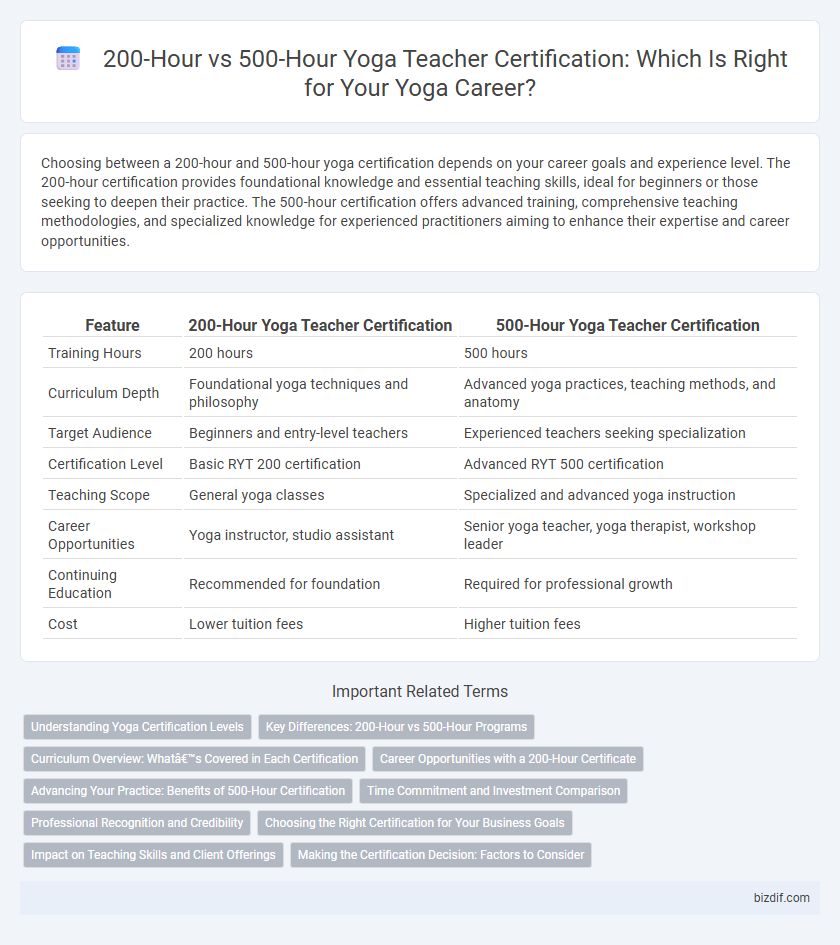Choosing between a 200-hour and 500-hour yoga certification depends on your career goals and experience level. The 200-hour certification provides foundational knowledge and essential teaching skills, ideal for beginners or those seeking to deepen their practice. The 500-hour certification offers advanced training, comprehensive teaching methodologies, and specialized knowledge for experienced practitioners aiming to enhance their expertise and career opportunities.
Table of Comparison
| Feature | 200-Hour Yoga Teacher Certification | 500-Hour Yoga Teacher Certification |
|---|---|---|
| Training Hours | 200 hours | 500 hours |
| Curriculum Depth | Foundational yoga techniques and philosophy | Advanced yoga practices, teaching methods, and anatomy |
| Target Audience | Beginners and entry-level teachers | Experienced teachers seeking specialization |
| Certification Level | Basic RYT 200 certification | Advanced RYT 500 certification |
| Teaching Scope | General yoga classes | Specialized and advanced yoga instruction |
| Career Opportunities | Yoga instructor, studio assistant | Senior yoga teacher, yoga therapist, workshop leader |
| Continuing Education | Recommended for foundation | Required for professional growth |
| Cost | Lower tuition fees | Higher tuition fees |
Understanding Yoga Certification Levels
200-Hour Yoga Certification establishes foundational knowledge in anatomy, philosophy, and teaching methods essential for beginner instructors. The 500-Hour Certification builds upon this base, offering advanced training in specialized techniques, therapeutic practices, and deeper study of yoga philosophy. Understanding these levels helps practitioners choose a program that aligns with their career goals and ensures compliance with Yoga Alliance standards.
Key Differences: 200-Hour vs 500-Hour Programs
The 200-hour yoga teacher training certification offers foundational knowledge and basic teaching skills, typically covering essential asanas, anatomy, and teaching methodology. In contrast, the 500-hour certification includes advanced training with deeper study of philosophy, alignment, anatomy, and practical teaching experience, designed for those seeking to refine their expertise or specialize further. Completion of the 200-hour program is a prerequisite for enrolling in most 500-hour courses, emphasizing progressive skill development and comprehensive mastery.
Curriculum Overview: What’s Covered in Each Certification
200-Hour Yoga Teacher Training Certification covers foundational topics such as yoga philosophy, basic asanas, anatomy, alignment principles, and teaching methodology, providing essential skills for instructing beginner-level classes. The 500-Hour Certification builds upon this foundation by deepening knowledge in advanced anatomy, therapeutic yoga, specialized styles, sequencing, and student adjustments to enhance teaching proficiency and versatility. Both certifications emphasize practical teaching hours, with the 500-Hour course offering expanded curriculum for experienced teachers seeking comprehensive skill development.
Career Opportunities with a 200-Hour Certificate
A 200-Hour Yoga Teacher Training Certification offers foundational skills essential for teaching beginner to intermediate classes and provides entry into the yoga instruction career field, enabling employment at studios, gyms, and wellness centers. This certification meets the minimum standard recognized by Yoga Alliance, allowing teachers to register as RYT-200, which enhances credibility and job prospects. While a 500-Hour certification deepens expertise and expands teaching opportunities, a 200-Hour certificate remains the primary qualification for launching a professional yoga teaching career.
Advancing Your Practice: Benefits of 500-Hour Certification
The 500-hour yoga teacher certification offers deeper knowledge in anatomy, advanced teaching methodologies, and specialized styles, significantly enhancing teaching skills beyond the foundational 200-hour certification. Completing a 500-hour program results in greater career opportunities, increased confidence, and the ability to design more tailored yoga experiences for diverse student needs. This advanced training supports continued personal growth and professional development within the global yoga community.
Time Commitment and Investment Comparison
The 200-hour yoga teacher certification typically requires a shorter time commitment, often completed in a few months, making it a more accessible option for beginners. In contrast, the 500-hour certification demands extensive study over a longer period, often a year or more, providing a deeper understanding and advanced teaching skills. Financially, the 500-hour certification generally involves a higher investment due to its comprehensive curriculum and extended training hours.
Professional Recognition and Credibility
The 500-hour yoga instructor certification offers deeper specialization and advanced techniques compared to the foundational 200-hour certification, enhancing professional recognition within the yoga community. Many studios and wellness centers prioritize hiring instructors with 500-hour credentials, considering them more credible and experienced. Holding a 500-hour certification often leads to greater career opportunities, higher pay rates, and increased trust from students and peers alike.
Choosing the Right Certification for Your Business Goals
Choosing between a 200-hour and 500-hour yoga certification depends on your long-term business goals and desired depth of expertise in yoga instruction. The 200-hour certification provides foundational knowledge suitable for beginner instructors aiming to start teaching or open small studios, while the 500-hour certification offers advanced training ideal for those seeking to deepen their practice, specialize, or expand their offerings. Consider market demand, target clientele, and professional credibility when selecting the certification to align with your strategic business objectives.
Impact on Teaching Skills and Client Offerings
200-hour yoga certification lays the foundation for essential teaching skills, covering anatomy, postures, and basic philosophy suitable for beginners or general classes. The 500-hour certification enhances expertise with advanced techniques, specialized training, and deeper understanding of yoga styles, enabling instructors to offer diverse and tailored client sessions. This advanced credential significantly broadens teaching capabilities and client engagement, often leading to higher demand and professional credibility.
Making the Certification Decision: Factors to Consider
Choosing between a 200-hour and 500-hour yoga certification depends on your career goals, prior experience, and depth of knowledge desired. The 200-hour certification provides foundational training suitable for beginners or those seeking to teach basic yoga classes, while the 500-hour certification offers advanced skills and specialization for experienced instructors aiming to expand their expertise. Consider factors such as time commitment, investment cost, and desired teaching scope when making the certification decision.
200-Hour Certification vs 500-Hour Certification Infographic

 bizdif.com
bizdif.com